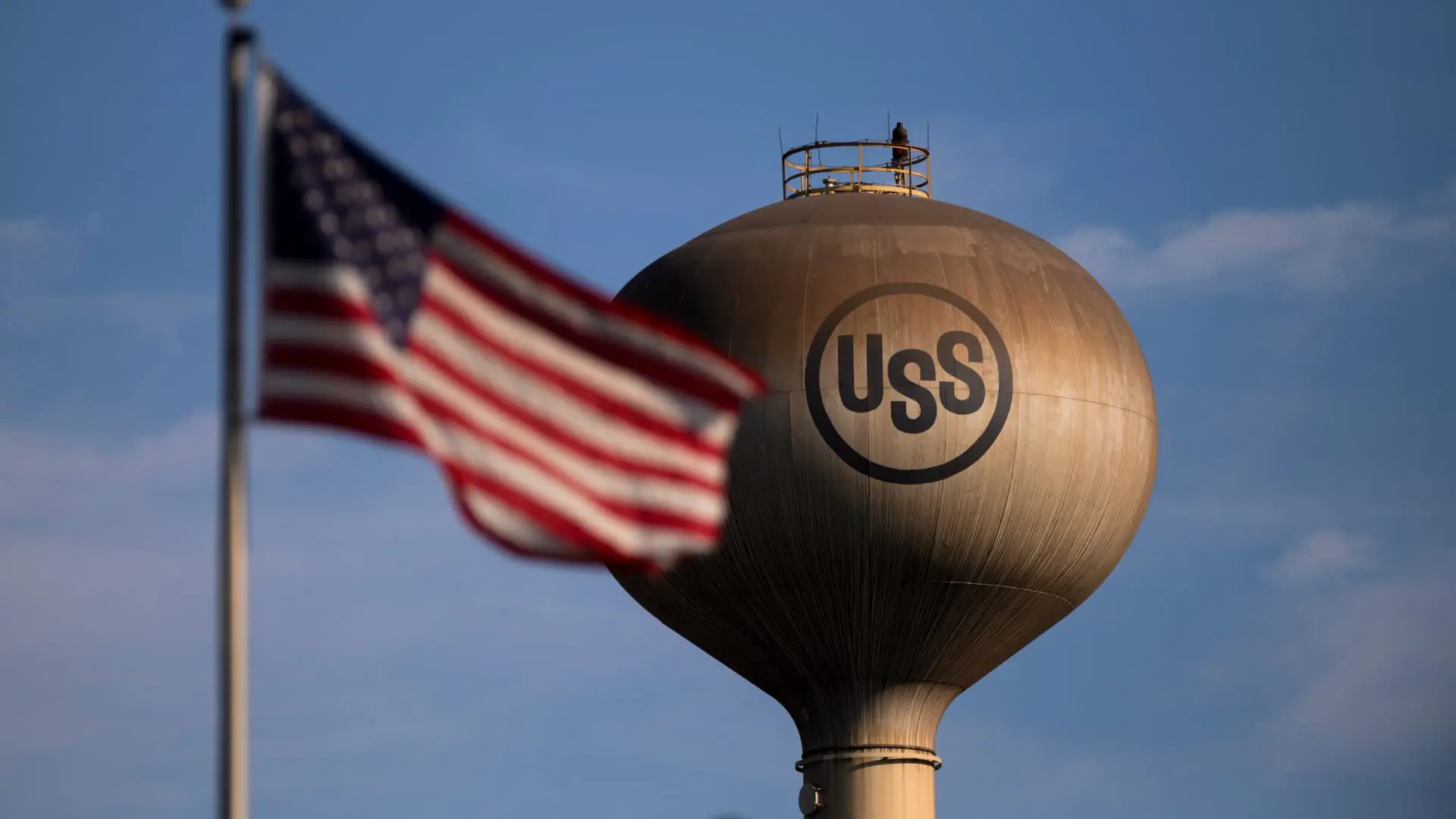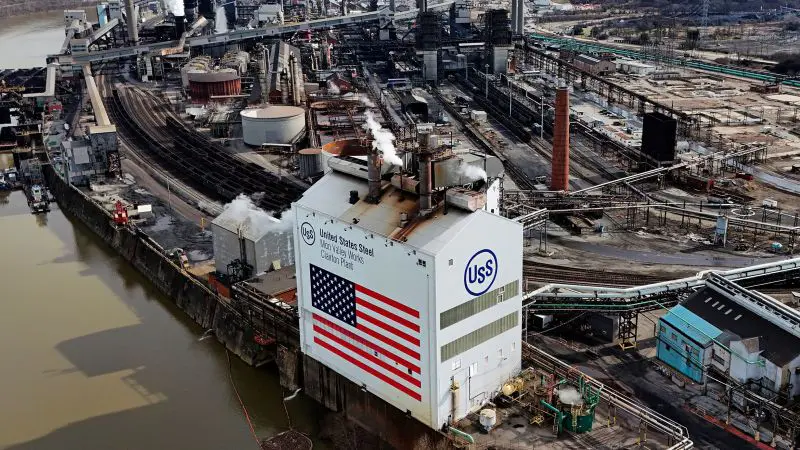Biden decides to block Nippon Steel’s $15 billion acquisition of U.S. Steel: Report

U.S. President Joe Biden has decided to block Nippon Steel's $14.9 billion takeover bid of U.S. Steel, The Washington Post reported Friday, citing two unnamed administrative officials who did not have permission to speak about the matter.
The White House is expected to announce Biden's decision as soon as Friday, according to the Post.
The decision on whether to let the deal proceed was referred to Biden on Dec. 23 after the Committee on Foreign Investment in the United States failed to reach a consensus, said U.S. Steel.
Biden had 15 days to approve or block the deal after the CFIUS evaluation reached his desk, which prompted Nippon Steel to extend the transaction's deadline to the first quarter of 2025 from the third or fourth quarter of 2024.
The CFIUS was concerned that, following the acquisition, Nippon Steel could cut the production capacity of U.S. Steel, which would pose a risk to the national security of the United States.
"Potential reduced output by U.S. Steel could lead to supply shortages and delays that could affect industries critical to national security," the Post reported the CFIUS as stating in its evaluation.
To assuage that worry, Nippon Steel on Tuesday offered the U.S. government the ability to veto any reductions to the company's steel production.
Nippon Steel had previously offered a number of concessions regarding the transaction, such as keeping U.S. Steel headquartered in Pittsburgh and staffing the board of directors of U.S. Steel with U.S. citizens.
The deal was backed by U.S. Steel shareholders, who voted in April for it to go through.
"The overwhelming support from our stockholders is a clear endorsement that they recognize the compelling rationale for our transaction with NSC," said U.S. Steel President and CEO David B. Burritt.
But those factors were not enough to sway Biden, who has long publicly opposed the deal. In March, Biden released an official statement saying that "it is vital for [U.S. Steel] to remain an American steel company that is domestically owned and operated."
U.S. President-elect Donald Trump has also voiced his resistance to Nippon Steel's proposed acquisition.
"I am totally against the once great and powerful U.S. Steel being bought by a foreign company, in this case Nippon Steel of Japan," Trump said in a post on his social media platform Truth Social on Dec. 2.
Japan-listed Nippon Steel shares were last up 1.2% at 1 a.m. Eastern time.
— CNBC's Lee Ying Shan contributed to this report.
Biden blocks Japan’s Nippon from taking over US Steel

President Joe Biden said Friday he is blocking a $14.3 billion acquisition of US Steel by Japan’s Nippon Steel, marking a significant use of executive authority in the closing days of his administration.
“As I have said many times, steel production – and the steel workers who produce it – are the backbone of our nation,” he said in a statement. “A strong domestically owned and operated steel industry represents an essential national security priority and is critical for resilient supply chains.”
The move, which was first reported in the Washington Post and New York Times, is not a surprise but could have implications for future foreign investment in American companies. Biden has long said he opposed the deal, which was announced a year ago. President-elect Donald Trump also said he opposes the deal and that he also would block it once he takes office.
The deal has been politically charged since it was announced in December of 2023, stirring bipartisan political opposition to foreign control of a once key component of US industrial might which has fallen on hard times. Blocking the deal could be politically popular domestically but could scare away foreign investment in other US companies. It could also starve US Steel of investment it says it needs.
Late last month, the Committee for Foreign Investment in the United States, known colloquially as CFIUS, notified Biden that it had not reached a consensus about whether or not US Steel’s sale to Nippon would pose a national security risk, leaving the decision up to the president to determine whether or not to block the deal on national security grounds.
The United Steelworkers union has strongly opposed the deal since the moment it was announced, arguing that Nippon has not given it sufficient guarantees that it would protect unionized jobs at some of the company’s older mills staffed by union members. But Biden’s opposition to the deal may not be the final say: Nippon and US Steel have vowed to fight to win approval of the deal in court even if the Biden or incoming Trump administration tries to block it.
US Steel and Nippon argue the deal is necessary to provide needed investment in the US Steel’s domestic steel operations. US Steel has claimed it could be forced to shut down the mills represented by the USW if it doesn’t get the $2.7 billion in investment planned by Nippon Steel as part of its proposed $14.3 billion purchase
The proposed purchase was bound to be unpopular. US Steel was once a symbol of American industrial might. It was the most valuable company in the world and the first to be worth $1 billion soon after its creation in 1901. It was also crucial to the US economy and the cars, appliances, bridges and skyscrapers that tangibly indicated that strength.
But it has suffered through decades of decline since its post-World War II height. It is no longer even the largest US steelmaker, and a relatively minor employer, with 14,000 US employees – 11,000 of whom are USW members. But it is still not a company that politicians who enjoy talking about the American greatness want to see fall into foreign hands – particularly in the politically significant state of Pennsylvania.
Demonstrating that blocking the deal appears political in nature, Trump opposed Nippon’s purchase of US Steel, but recently welcomed a $100 billion investment from Japan’s Softbank, including funds for investment in US artificial intelligence technology – arguably far more important for national security. If US Steel’s purchase by a Japanese company poses a national security threat, some foreign investors may think twice about spending resources on mergers and acquisitions or investments in American companies.
Multiple officials familiar with the review expressed concern to CNN that the decision would be seen as a watershed moment for the Committee on Foreign Invesment in the United States, or CFIUS, which has authority to evaluate mergers on national security grounds.
The conclusions of the Cabinet-level political appointees who comprise the Committee are informed by the work of roughly a hundred career staffers tasked with evaluating a deal on its merits without political influence. In the US Steel case, the majority of agencies concluded that the deal posed no national security risk, and officials expressed concern that the president’s own position - to keep the company from being foreign-owned even if it meant denying it a large infusion of capital from Nippon - was misguided.
“Bad decision,” one senior administration official said of Biden’s forthcoming move to block the deal. “Doesn’t actually protect union jobs and may kill the company.”
Shares in US Steel (X) were down by more than 8% in pre-market trade on Friday.
CNN’s Anna Cooban contributed to this story.
This is a developing story and will be updated.

